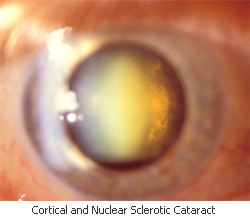 Treatment for Cataracts
Treatment for Cataracts
Treatment for Cataracts Requires Surgery to Remove the Crystalline Lens of the Eye
There is only one known treatment for cataracts - surgery! A cataract needs to be removed only when vision loss interferes with your everyday activities, or the things you like to do such as driving, reading, sewing, playing golf or watching TV . You and your eye care professional can make this decision together. Once you understand the benefits and risks of surgery, you can make an informed decision about whether cataract surgery is right for you. In most cases, delaying cataract surgery will not cause long-term damage to your eye or make the surgery more difficult. You do not have to rush into surgery.
Additionally, Medicare and most commercial insurance carriers require that best corrected vision be reduced to some level (often 20/50 visual acuity) or for the person to have glare problems before they will approve the surgery for payment.
Sometimes a cataract should be removed even if it does not cause problems with your vision. For example, a cataract should be removed if it prevents examination or treatment of another eye problem, such as age-related macular degeneration or diabetic retinopathy.
Cataract Surgery
If you choose surgery, your Master Eye Associates optometrist will refer you to an ophthalmic surgeon to remove the cataract. This is a very definite advantage over choosing an eye surgeon out of the phone book or from your friends because our doctors know firsthand the quality of the cataract surgery performed by local eye surgeons. Because we work with the eye surgeons and usually perform some or all of the post-op care we truly know where to refer you for the best possible outcome. If you have cataracts in both eyes that require surgery, the surgery will be performed on each eye at separate times, usually four to eight weeks apart.
As with any surgery, cataract surgery poses risks, such as infection and bleeding, posterior capsular opacification, corneal problems and cystoid macular edema. Before cataract surgery, your doctor may ask you to temporarily stop taking certain medications that increase the risk of bleeding during surgery. After surgery, you must keep your eye clean, wash your hands before touching your eye, and use the prescribed medications to help minimize the risk of infection. Serious infection can result in loss of vision. Talk to your eye care professional about these risks. Make sure cataract surgery is right for you.
Premium IOL Options Provide Vision
at Near and Far
Cataract surgery involves removal of the crystalline lens inside the eye, which is cloudy or opacified. An artificial lens implant (IOL) is then inserted into the eye in place of the natural crystalline lens. Until the early 2000's there were only single vision IOL's available. Since then multifocal or "accommodating" IOL's have been available. Learn about the options available for the premium IOL's that correct both far and near vision.
Cataract surgery can now be performed by a laser! Learn about laser cataract surgery!
Cataract surgery slightly increases your risk of retinal detachment. Other eye disorders, such as high myopia (nearsightedness), can further increase your risk of retinal detachment after cataract surgery. One sign of a retinal detachment is a sudden increase in flashes or floaters. Floaters are little "cobwebs" or specks that seem to float about in your field of vision. If you notice a sudden increase in floaters or flashes, see an eye care professional immediately. A retinal detachment is a medical emergency. If necessary, go to an emergency service or hospital. Your eye should be examined by a retinal specialist as soon as possible. A retinal detachment causes no pain. Early treatment for retinal detachment often can prevent permanent loss of vision. The longer the retina stays detached, the less likely you will regain good vision once you are treated. Even if you are treated promptly, some vision may be lost.

Preventing Cataracts
Wearing sunglasses and a hat with a brim to block ultraviolet sunlight may help to delay the formation of cataracts. If you smoke, stop. Researchers also believe good nutrition can help reduce the risk of age-related cataract. They recommend eating green leafy vegetables, fruit, and other foods with antioxidants. However, the harsh reality is that if you live long enough you will develop cataracts that require surgical removal to restore vision.
If you are age 60 or older, you should have a comprehensive dilated eye exam at least once every year. In addition to cataracts, our optometrists will check for signs of age-related macular degeneration, glaucoma, and other vision disorders. Early treatment for many eye diseases may save your sight.
Learn about the newest technology for cataract surgery, Laser Cataract Surgery.

